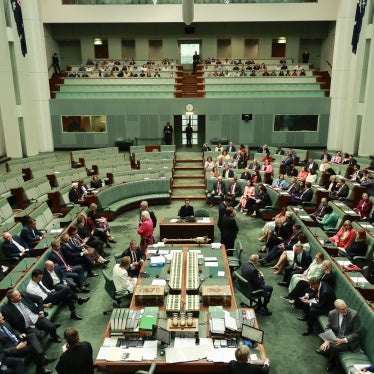The British government's proposal to expand the use of secret court hearings in civil cases came one step closer to becoming law yesterday, raising serious concerns for human rights and the principles of open justice. The House of Commons began debating the law on December 18, approving it to proceed to the committee stage for detailed scrutiny. But while the parliamentary process was routine, the contents of the bill are far from it.
The much criticised Justice and Security Bill would widen the use of secret hearings known as 'closed material proceedings', or CMPs, in the civil courts on national security grounds, excluding the person affected and their lawyer from the courtroom. Parts of the judgements would also be kept secret, meaning someone could be found guilty without being told what they were guilty of. Such hearings would undermine a basic principle of justice: the ability to know and challenge the case against you. A second part of the bill would also prevent disclosure of material showing the United Kingdom's involvement in wrongdoing by other countries.
The legislation, if approved, would likely fall foul of the UK's obligations under the International Covenant on Civil and Political Rights and the European Convention on Human Rights, to respect everyone's right to a fair and public trial in all civil as well as criminal cases, contravening the principle that, "not only must justice be done; it must also be seen to be done".
A key argument put forward by the UK government to justify the expansion of the use of CMPs is that it cannot, by the current system of open civil courts, fairly defend itself without disclosing classified material in relation to national security issues. The government asserts that as a result, it has had to settle expensive claims it might otherwise have won, dishing out millions of taxpayers' money unnecessarily. But this argument conveniently ignores the fact that the government already has the ability to ask a court to strike out any case it believes it cannot fairly defend without the disclosure of material that would compromise national security before deciding to settle.
In the recent case of Sami al-Saadi, on December 13, the UK government paid out £2.2m as compensation to a Libyan dissident over its complicity in his rendition and subsequent torture. That the government made no attempt to strike out the claim suggests that its concern with the current law is not the imputed inability to defend itself, but the desire to shield itself from evidence of torture being aired in an open court. Any evidence of the use of torture, an international crime, must be subject to scrutiny and not concealed or, worse, thrown out through fear of costly claims.
The government's plans to widen the use of secret hearings were announced by Prime Minister David Cameron in July 2010 after a series of embarrassing revelations came to light. The most prominent of these was the case of British citizen and former Guantanamo Bay detainee Binyam Mohammed, who brought a civil case against the British government for its alleged involvement in his interrogation and torture. In his case, the previous government had fought hard to prevent the publication of seven paragraphs of the court judgement which, when finally published, revealed that the UK knew early on that Binyam Mohammed was being subjected to torture.
This was deeply embarrassing and in this context, it's hard to avoid the conclusion that a key motivation of the proposals is to ensure that if abuses are repeated, they will not come to light in British courts. The House of Lords, which reviewed the Justice and Security Bill first, made significant amendments to the secret hearings provision. The amendments included a requirement to use such hearings only as a last resort; and a duty on the court to balance national security against fairness and open justice in deciding whether to allow secret hearings. In addition, either party would be able to apply for secret hearings, as opposed to the right being limited to the government.
Presenting the bill in the House of Commons on December 18, minister Ken Clarke conceded one of the most important of the Lords' amendments in Tuesday's debate, accepting that judges should have the discretion to decide whether court hearings can be held in secret. But the only change to the bill that would address the fundamental unfairness of secret hearings would be to remove them entirely from the bill. If the British Parliament allows plans for secret courts to become law, it will set a dangerous precedent that risks undermining the rule of law. Many countries look to Britain as a model for justice. But secret justice is no justice at all.
Read more: http://www.publicserviceeurope.com/article/2883/uk-secret-court-plans-da...






